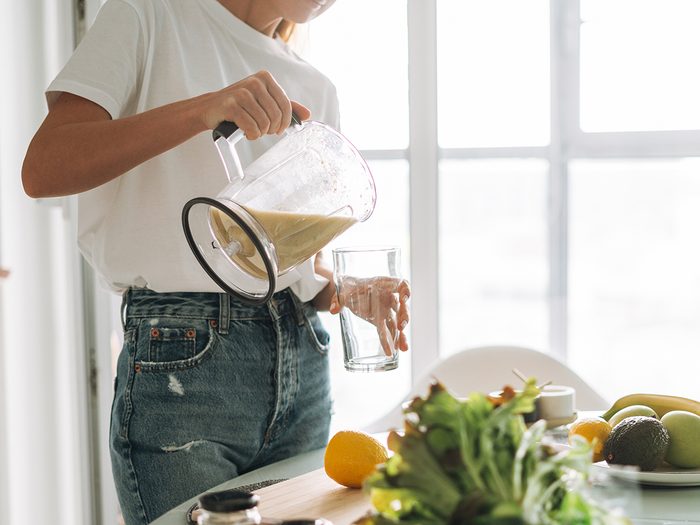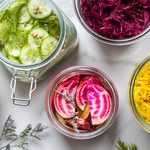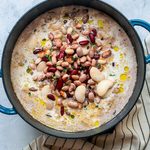It Might Be Time to Stop Worrying About Your Protein Intake

A registered dietitian debunks all the protein myths you’ve ever wondered about.
For years, people have been very concerned I’m not getting enough protein. Old colleagues, family friends and fitness instructors have all suggested I make an effort to consume more of it to compensate for my vegetarian diet. Where did this idea come from? Have you ever heard of anyone being protein-deficient and seriously in need of more?
Opportunities to top-up your protein consumption are everywhere. There are chicken and tofu add-on options for salads on restaurant menus, there are shelves of packaged protein bars at grocery stores and gas stations and there are tubs of it in powder form stashed on fridges, waiting to be scooped into smoothies and water bottles. But are there scientifically-proven benefits to eating all this additional protein? Or are we all victims of an ingenious marketing trick?
First, let’s review why protein is an essential part of a healthy diet: It helps repair tissue, supply the body with nutrients, aid digestion, regulate hormones, curb hunger and lower your risk of high blood pressure. When it comes to fitness, protein helps speed up recovery and build muscle, too. So, I can see why people may be inclined to load up their plate with extra protein—but it’s actually not at all necessary. According to Madalyn Higgins, a registered dietitian in Wolfville, N.S., the average person gets more than enough protein.
“Someone who’s consuming protein, plant-based or animal-based, a few times throughout the day will not be deficient in it,” says Higgins. That’s because protein is in more foods than you think—like grains, bread and vegetables. “Those foods might not contain enough to keep you at your optimal nutritional needs, but they’ll keep you from being deficient.” And this goes for the herbivore set as well. A 2016 study showed most vegetarians and vegans have no problem meeting the recommended amount of protein.
According to Health Canada, you only need to eat small amounts of protein to meet your nutritional needs. Specifically, about 10 percent of your daily calories should come from protein. And eating more than the recommended amount doesn’t necessarily offer greater health benefits.
So if we’re all getting plenty, why’s everyone obsessed with consuming more? Higgins says marketing, in fact, has a lot to do with it. “Many companies that sell protein powders are really good at drawing the connection between protein and muscle growth and strength,” she says. “So people are led to believe that consuming more protein is the way to get [fit].” While protein is certainly necessary for building muscle, most of us still don’t need to consume extra to reap its strength-building benefits. “Bodybuilders are the only people who may need to eat more of it,” she says.
Still have questions? Below, Higgins helps us distinguish protein facts from fiction.
A 2004 study published in the Journal of Sports Science and Medicine found animal proteins to be an important source of protein. Is meat actually essential for a healthy diet?
“Absolutely not,” says Higgins. Protein is protein, and there are plenty of plant-based options available. In fact, Health Canada recommends many vegetarian-friendly ones, including beans, lentils, nuts, seeds, eggs and dairy products. “If you’re eating a variety of foods throughout your days and weeks, you’ll get more than enough protein as a vegetarian or even vegan,” says Higgins.
We know that some protein isn’t good for you—processed meats have been linked to heart disease, diabetes and various forms of cancer; red meat can give you an increased risk of heart disease—so what are the healthiest sources of protein?
Aside from the aforementioned vegetarian proteins, Health Canada also recommends lean meats, poultry and fish. Higgins is a pescatarian and sings the praises of fish. “It’s a good way to get some of those heart-healthy fats as well, which help with reducing inflammation,” she says. “So if you’re working out a lot, that’s something you’d want to help with recovery.”
The rule used to be that you should eat the amount of protein that equates to the palm of your hand—is that still the gauge?
There’s no need to be overly concerned with the portion, says Higgins. Instead, she recommends trying to include a little protein with all meals and snacks as it helps with satiety. “For a snack, add a little butter, cheese or chia seeds to whatever you’re eating,” she suggests. “For a meal, incorporate some tofu, beans, chicken or fish into it.”
The health food aisle is packed with protein bars and powders. Who may want to reach for them?
Higgins says she doesn’t generally recommend protein powder for most people since it’s easy to get enough through food sources alone. And as for protein bars, while they could be great for keeping you feeling full for longer—protein helps keep hunger at bay—many of them are full of sugar, so they shouldn’t be thought of as a healthy snack. They’re more like a candy bar.
Now that we’ve confirmed it’s unlikely to be protein-deficient, is it possible to consume too much of it?
“If you’re consuming a lot of protein powder or large quantities of protein from animal sources, you can get too much, which can cause a little bit of damage to your kidneys,” says Higgins. “But it’s rare and pretty hard to do.”
Next: The Healthiest Milk for Your Coffee, According to Registered Dietitians
Renée Reardin is an editor at Best Health and the author of a newsletter called Curious Chat, where she questions wellness beliefs just like this one. Subscribe below!




